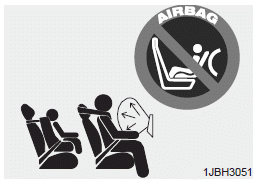Hyundai Palisade: General Information / Warning and Caution Labels
Hyundai Palisade (LX2) 2020-2025 Service Manual / General Information / Warning and Caution Labels
General information
| Warning and Caution Labels |

| 1. Radiator cap caution 2. Fan caution |
3. Battery caution |
Battery Caution Label

Warning / Caution Label (Cont'd)
|
A. Keep lighted cigarettes and all other flames or sparks away from the battery. |
|
B. Wear eye protection when charging or working near a battery. Always provide ventilation when working in an enclosed space.
|
|
C. Keep batteries out of the reach of children because batteries contain highly corrosive SULFURIC ACID. Do not allow battery acid to contact your skin, eyes, clothing or paint finish. |
|
D. If any electrolyte gets into your eyes, flush your eyes with clean water for at least 15 minutes and get immediate medical attention. If possible, continue to apply water with a sponge or cloth until medical attention is received. If electrolyte gets on your skin, throughly wash the contacted area. If you feel a pain or a burning sensation, get medical attention immediately. |
|
E. Always read the following instructions carefully when handing a battery. |
|
F. Hydrogen, which is a highly combustible gas, is always presents in battery cells and may explode if ignited. |
|
G. An improperly disposed battery can be harmful to the environment and human health. Always confirm local regulations for battery disposal. |
Handling and Storage the Battery
|
Battery Itself |
|
||||||
|
Battery on Vehicle |
|
After reconnecting or recharging a discharged battery, the ESP OFF indicator
may illuminate.
In this case, turn the handle half way to the left and right whilst
the ignition switch is in the ON position.
Then, restart the engine after the ignition is OFF.
The ESP OFF indicator may turn OFF.
If the ESP OFF indicator does not turn OFF, have the system checked.
(Refer to the DTC guide)
|
 Identification Numbers
Identification Numbers
General information
Identification Number
Identification Number Description
Vehicle Identification Number
1.
World Manufacturer Identifier (WMI)
- KMF : Commercial vehicle (Van)
- KMH : Passenger vehicle or MPV (Multipurpose Passenger Vehicle) /
SUV (Sports Utility Vehicle) /RV (Recreational Vehicle)
- KMJ : Van
2...
 Lift and Support Points
Lift and Support Points
General information
Lift and Support Points
•
When raising the vehicle with a two-post car lift to service
the bottom of the vehicle, check the vehicle bottom and make
sure not to damage the floor under cover, fuel tank, fuel filter
and canister...
Other information:
Hyundai Palisade (LX2) 2020-2025 Service Manual: Specifications
Specification Item Specification Power source 3V Operating temperature -20°C to +60°C (-4°F to- +140°F) RF Modulation FSK LF Modulation ASK RF frequency 433...
Hyundai Palisade (LX2) 2020-2025 Service Manual: Components and components location
Component Location 1. Start Stop Button(SSB) 2. FOB key 3. Tailgate open switch 4. Interior antenna 1 5. Interior antenna 2 6. Intergrated Body Control Unit (IBU) 7. Trunk antenna 8. Door handle & door antenna 9...
Categories
- Manuals Home
- 1st Generation Palisade Owners Manual
- 1st Generation Palisade Service Manual
- Rear center seatbelt (3rd row)
- Removing and Storing the Spare Tire
- Auto Hold
- New on site
- Most important about car
Do Not Install a Child Restraint in the Front Passenger's Seat

Even though your vehicle is equipped with the OCS, never install a child restraint in the front passenger's seat. An inflating air bag can forcefully strike a child or child restraint resulting in serious or fatal injury.
Copyright © 2025 www.hpalisadelx.com

